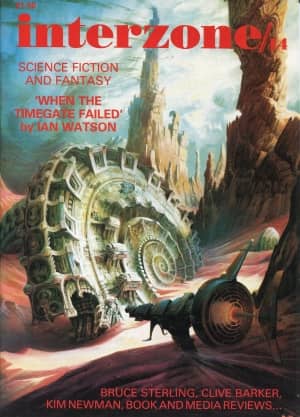Birthday Reviews: David Zindell’s “Caverns”

David Zindell was born on November 28, 1952.
Zindell was a first place winner of the 1985 Writers of the Future Third Quarter contest with the story “Shanidar,” which Terry Carr subsequently selected for his Terry Carr’s Best SF of the Year #15. The next year, he was nominated for the John W. Campbell Award for Best New Writer. His novels Neverness and The Broken God were both nominated for the Arthur C. Clarke Award.
“Caverns” was originally published in the Winter 1985/6 issue of Interzone, edited by Simon Ounsley and David Pringle. In 1987 it was translated into German for publication in Wolfgang Jeschke’s anthology L Wie Liquidator. It has never been reprinted in English.
“Caverns” is a tragic love story between the narrator and his wife, Mary. The narrator has decided to undergo an experimental process of introducing neurophages into his system in order to take the next evolutionary leap. Mary is unwilling to participate in the experiment with him and the two grow apart through the story, which is told in alternating sections, some of which details his divergence from humanity and others which show his relationship disintegrating.
It is important to note that even the earliest parts of his human relationship are not particularly strong. It is clear that the narrator never really listens to what his wife is saying, although she also doesn’t appear to be very good at communication. When she tells him she’s pregnant, for instance, he’s surprised at the news, but she seems to think he should have known without having to tell him. As the neurophages take hold, it becomes clear that even as he insists that he needs her, the two are leading parallel and only occasionally convergent lives. He loves not Mary, but his impression of who she is. Told from his point of view, Mary’s needs can only be conjectured as she strives to give him what she thinks he might need, often to her own detriment and without actually understanding what he is looking for.
As an exploration of a couple growing apart through the controlling nature of one of them and his curiosity to push himself in new directions, “Caravans” works well. Unfortunately, neither the narrator nor Mary are particularly sympathetic characters, which limits the emotional attachment the work has for the reader. Their strongest tie appears to be that the narrator remembers, even as he loses so much of who he was, the fact that Mary loved the poetry of Samuel Taylor Coleridge and he tries to use that to keep them together long after their relationship has been destroyed by his actions.
Reviewed in its original appearance in the magazine Interzone 14, edited by Simon Ounsley and David Pringle, Winter 1985/6.
 Steven H Silver is a sixteen-time Hugo Award nominee and was the publisher of the Hugo-nominated fanzine Argentus as well as the editor and publisher of ISFiC Press for 8 years. He has also edited books for DAW and NESFA Press. He began publishing short fiction in 2008 and his most recently published story is “Webinar: Web Sites” in The Tangled Web. Steven has chaired the first Midwest Construction, Windycon three times, and the SFWA Nebula Conference 6 times, as well as serving as the Event Coordinator for SFWA. He was programming chair for Chicon 2000 and Vice Chair of Chicon 7.
Steven H Silver is a sixteen-time Hugo Award nominee and was the publisher of the Hugo-nominated fanzine Argentus as well as the editor and publisher of ISFiC Press for 8 years. He has also edited books for DAW and NESFA Press. He began publishing short fiction in 2008 and his most recently published story is “Webinar: Web Sites” in The Tangled Web. Steven has chaired the first Midwest Construction, Windycon three times, and the SFWA Nebula Conference 6 times, as well as serving as the Event Coordinator for SFWA. He was programming chair for Chicon 2000 and Vice Chair of Chicon 7.
And the all but forgotten Donald J. Pfeil is forgotten again!
(OK, the only editor he sold short fiction to was, let me see … Don Pfeil! But I did like his light Space Opera VOYAGE TO A FORGOTTEN SUN.)
Zindell did some really cool stuff. And I see he returned after a long absence with a new novel, THE IDIOT GODS, in 2017. Has anyone read that?
Really got into his Requiem for Homo Sapiens series.